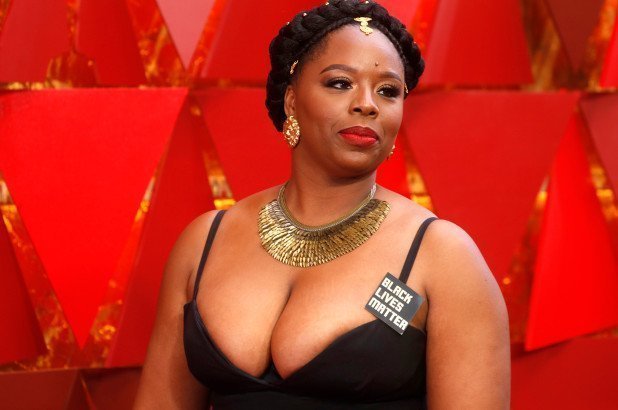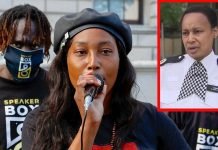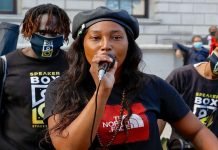The co-founder of Black Lives Matter who’s become a lightning rod over her lavish lifestyle has resigned.
Patrisse Cullors, 37, is leaving the Black Lives Matter Global Network Foundation effective Friday, after nearly six years leading the group.
“I’ve created the infrastructure and the support, and the necessary bones and foundation, so that I can leave,” she said. “It feels like the time is right.”
Patrisse Cullors, who has been at the helm of the Black Lives Matter Global Network Foundation for nearly six years, said she is leaving to focus on other projects, including the upcoming release of her second book and a multi-year TV development deal with Warner Bros. Her last day with the foundation is Friday.
“I’ve created the infrastructure and the support, and the necessary bones and foundation, so that I can leave,” Cullors told The Associated Press. “It feels like the time is right.”
However, her departure comes after it was controversial articles by right wing outlets claimed last month that Patrisse Cullors has amassed a $3 million property portfolio, despite describing herself as a trained Marxist”.
Cullors faced fierce backlash over the claims about her personal spending – including the recent purchase of a $1.4 million home in a ritzy L.A. neighborhood.
It caused many to question what percentage of BLM donations were actually going towards social justice programs.

Cullors’ departure follows a massive surge in support and political influence in the U.S. and around the world for the BLM movement, which was established nearly eight years ago in response to injustice against Black Americans. The resignation also comes on the heels of controversy over the foundation’s finances and over Cullors’ personal wealth.
The 37-year-old activist said her resignation has been in the works for more than a year and has nothing to do with the personal attacks she has faced from far-right groups or any dissension within the movement.
“Those were right-wing attacks that tried to discredit my character, and I don’t operate off of what the right thinks about me,” Cullors said.
As she departs, the foundation is bringing aboard two new interim senior executives to help steer it in the immediate future: Monifa Bandele, a longtime BLM organizer and founder of the Malcolm X Grassroots Movement in New York City, and Makani Themba, an early backer of the BLM movement and chief strategist at Higher Ground Change Strategies in Jackson, Mississippi.
“I think both of them come with not only a wealth of movement experience, but also a wealth of executive experience,” Cullors said.
The BLM foundation revealed to the AP in February that it took in just over $90 million last year, following the May 2020 murder of George Floyd, a Black man whose last breaths under the knee of a white Minneapolis police officer inspired protests globally. The foundation said it ended 2020 with a balance of more than $60 million, after spending nearly a quarter of its assets on operating expenses, grants to Black-led organizations and other charitable giving.
Critics of the foundation contend more of that money should have gone to the families of Black victims of police brutality who have been unable to access the resources needed to deal with their trauma and loss.
“That is the most tragic aspect,” said the Rev. T. Sheri Dickerson, president of an Oklahoma City BLM chapter and a representative of the #BLM10, a national group of organizers that has publicly criticized the foundation over funding and transparency.
“I know some of (the families) are feeling exploited, their pain exploited, and that’s not something that I ever want to be affiliated with,” Dickerson said.
Cullors and the foundation have said they do support families without making public announcements or disclosing dollar amounts.
In 2020, the BLM foundation spun off its network of chapters as a sister collective called BLM Grassroots, so that it could build out its capacity as a philanthropic organization. Although many groups use “Black Lives Matter” or “BLM” in their names, less than a dozen are considered affiliates of the chapter network.
Last month, Cullors was targeted by several conservative-leaning publications that falsely alleged she took a large annual salary from the foundation, affording her recent purchase of a southern California home.
In April, the foundation stated Cullors was a volunteer executive director who, prior to 2019, had “received a total of $120,000 since the organization’s inception in 2013, for duties such as serving as spokesperson and engaging in political education work.”
“As a registered 501c3 non-profit organization, (the foundation) cannot and did not commit any organizational resources toward the purchase of personal property by any employee or volunteer,” the foundation said in a statement. “Any insinuation or assertion to the contrary is categorically false.”
In 2018, Cullors released, “When They Call You a Terrorist: A Black Lives Matter Memoir,” which became a New York Times bestseller. She has also consulted on a number of racial justice projects outside of BLM, taking compensation for that work in her personal capacity.
She and the BLM movement have come a long way since its inception as a social media hashtag, following the 2013 acquittal of George Zimmerman, the neighborhood watch volunteer who killed 17-year-old Trayvon Martin in Florida.
Cullors, along with BLM co-founders Alicia Garza and Opal Tometi, pledged then to build a decentralized movement governed by consensus of a members’ collective. In 2015, a network of chapters was formed, while donations and support poured in. Garza and Tometi soon stepped away from day-to-day involvement in the network to focus on their own projects.
Cullors, who has arguably been the most publicly visible of the co-founders, became the foundation’s full-time executive director last year purely out of necessity, she said.
“We needed her,” said Melina Abdullah, who leads BLM Grassroots and co-founded, with Cullors, BLM’s first-ever official chapter in Los Angeles.
“George Floyd was killed and the whole world rose up,” Abdullah told the AP. “I would like her to be there forever, but I also know that that’s not feasible. The real test of any organization is can it survive the departure of its founders. And I have no question that Black Lives Matter will survive and grow and evolve, even with the departure of our final co-founder in a formal role.”
Support Independent Journalism Today
Our unwavering dedication is to provide you with unbiased news, diverse perspectives, and insightful opinions. We're on a mission to ensure that those in positions of power are held accountable for their actions, but we can't do it alone. Labour Heartlands is primarily funded by me, Paul Knaggs, and by the generous contributions of readers like you. Your donations keep us going and help us uphold the principles of independent journalism. Join us in our quest for truth, transparency, and accountability – donate today and be a part of our mission!
Like everyone else, we're facing challenges, and we need your help to stay online and continue providing crucial journalism. Every contribution, no matter how small, goes a long way in helping us thrive. By becoming one of our donors, you become a vital part of our mission to uncover the truth and uphold the values of democracy.
While we maintain our independence from political affiliations, we stand united against corruption, injustice, and the erosion of free speech, truth, and democracy. We believe in the power of accurate information in a democracy, and we consider facts non-negotiable.
Your support, no matter the amount, can make a significant impact. Together, we can make a difference and continue our journey toward a more informed and just society.
Thank you for supporting Labour Heartlands












